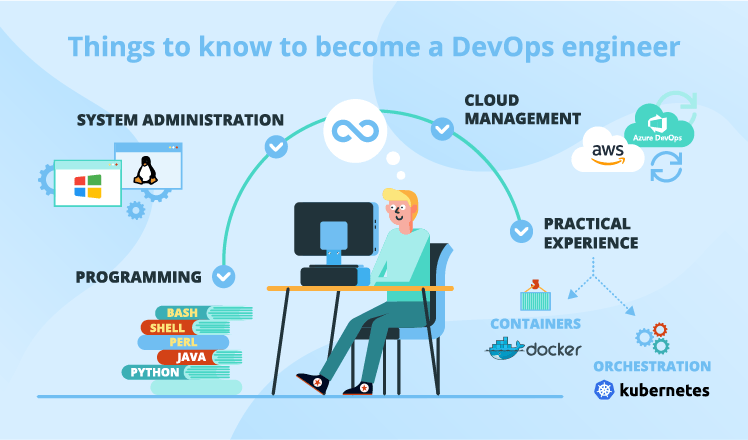
The development of technology has brought new concepts to our lives. Applications or software that we frequently use in both our professional and social lives provide significant convenience. One of these, DevOps, is a model of understanding that enables the rapid delivery of developed applications to customers. It is a combination of the concepts of ‘Development’ and ‘Operations’. Application Development and IT Operations provide a seamless and continuous integration. It is involved in all stages from coding to publishing the software. It works with experts in their field.
DevOps offers many features to its users. It helps you innovate quickly and enables you to be efficient. It offers competition with the advantage of fast delivery. Reliability guarantees the quality of DevOps applications, updates and infrastructure changes. Collaborates with developer and operation teams. Saves time. A DevOps engineer works in all areas of the IT industry as well as the software industry. Professionals working with computer applications stay up to date. People working in the Information Technology department consider DevOps as a philosophy and perspective. DevOps engineers who implement a software development strategy take on operational tasks. They solve problems in a systematic way. The DevOps engineer content will introduce you to the requirements, career path and tasks of the profession.
What is a DevOps Engineer?
DevOps is a strategy model used to bridge the gap between software developers and the IT team. a devops engineer is someone who takes this software model into the lifecycle and uses various automation tools to develop ci, cd digital pipelines. these tools include scrum, kanban and agile. the tools used in the devops lifecycle are planning, coding, building, testing, integration, execution and monitoring.
DevOps engineers work with software developers, system operators and other IT staff to supervise code developers. They check code releases with their team. DevOps, defined as a set of techniques, is a systematic way of solving problems. It has emerged as a result of the combination of some features with software. They are employees who coordinate between operations, testing and development functions that automate product integration and deployment processes in an orderly manner.
What Does a DevOps Engineer Do?

DevOps engineers work at every stage from scripting to coding, testing and deployment. They deal with network operations and system administrators. It promises an efficient work with continuous integration, delivery, microservices, infrastructure as code, monitoring and logging, communication and collaboration practices. It enables organizations to improve traditional software development and infrastructure management processes. It reliably delivers applications and services at high speed. Thus, it supports companies to compete effectively in the market. Engineers, who collaborate with operational developers and system administrators who move to the coding area, have a wide range of responsibilities. The duties of a DevOps engineer are as follows;
- They have detailed knowledge of computer programming languages and Linux.
- Design, create and test the integration deployment process using tools such as Jenkins.
- Works in collaboration with the development team for products that will meet the customer’s requests.
- Have hands-on experience with cloud-based tools such as AWS and Azure.
- Monitor the functions in cloud technology and write code with scalings to meet the needs.
- Uses code snippets in many programming languages. Supports the development of software that meets the needs of the company to which they are affiliated.
- Identifies customer and company needs in advance and works to close the gaps between technology and company operations.
- Tests the software codes and distributes them to the necessary areas. Thus, it ensures that the workflow continues smoothly without interruption.
- Directs the tools used to the business needs.
- Supports the flawless operation of automation tools by developing software.
- Sysadmin has knowledge about the roles and organizes IT operations.
- Manages source codes and works with different technologies and open source tools.
How to Become a DevOps Engineer?
Some training is required to become a DevOps engineer. First of all, you can graduate from technology-related departments of universities such as Computer Engineering, Computer Science, Information Technology, Electrical and Electronics Engineering, Electronics and Communication Engineering. If you wish, you can increase your knowledge and experience by continuing your graduate education. Along with university education, you should also participate in some certification programs. These programs include DevOps Concept and Fundamentals, Powershell Fundamentals, Linux Shell Scripting, Pyhton Scripting, Infrastructure As Code, Continous Integration, Configuration Management, Monitoring. Experience in Deployment Automation, Waste Project Management, Infrastructure Automation, Continuous Integration, Container Concepts, Cloud Technology, Open Source Operating System and Source Control is required.
To become a successful DevOps engineer, you may be involved in database, systems and IT project management. The sectors they work in are IT, telecommunications, finance and economics, commerce and services. Departments are engineering, IT, finance, R&D and technology. The skills a DevOps engineer should have are Apache HTTP Server, C#, C++, HTML and Java. Also, a good command of English is a must. An innovative perspective, a love of research, an openness to learning new technologies, and a patient and careful personality also provide important advantages in the career process. Engineers who carry out development activities make documentation in accordance with the processes. DevOps engineers need to have strong human relations. It makes the working process fast and easy with its predisposition to teamwork.
What are your tasks as a DevOps engineer?
As a DevOps engineer, your duties may include improving the relationship and collaboration between the development and operations team. In addition, the DevOps engineer’s tasks also include supporting technical projects, including design, installation and security of systems, code development and deployment, monitoring, efficiency and tracking of server and application performance, automation and data analytics.
Which technologies does a DevOps engineer use?
This can vary depending on the particular work environment. As a DevOps engineer, we often use many different infrastructures and solutions. For example, we may use Amazon Web Services (AWS), Microsoft Azure, Google Cloud Platform (GCP), Kubernetes, Docker, Jenkins, Chef, Puppet, Ansible, Nagios, Terraform, Splunk and others. We can also use various coding languages and databases.
How do you increase productivity as a DevOps engineer?
- Automation: Move software development processes, deployment and maintenance processes, testing processes and all of these to a common platform to increase efficiency by increasing automation.
- Common Platform: Avoid duplication of effort and facilitate collaboration between different teams by using common practices on a common platform.
- Monitoring and Measurement: Use a reliable solution to monitor, measure and record DevOps processes. This way, you can access the right data to optimize and improve existing processes.
- Training: Support the training of team members on DevOps-related topics and increase your employees’ ability to grasp new technologies.
- Instant feedback: Providing instant feedback to engineers as they perform their tasks is important to quickly see if their code, scenarios and solutions are correct.
- Management: Develop strategies to organize DevOps processes and the work of employees.
- Global scale: Implement DevOps on a global scale, supporting team members to work on a common platform.
What are the main responsibilities of a DevOps engineer?
Ensuring Efficient Cooperation
The first task of the DevOps engineer is to ensure smooth and efficient collaboration between the software development and system operations teams. This is achieved through the integration of development and operations processes and continuous communication.
Infrastructure and Automation Responsibility
DevOps engineers also play an important role in automating processes and managing infrastructure. This requires the use of appropriate tools and methods and the design and implementation of scalable and secure systems to deliver efficient infrastructure services.
Code Integration and Deployment
DevOps professionals play a critical role in continuous integration (CI) and continuous deployment (CD) practices. They do this by optimizing and managing systems and processes for the regular and proper deployment, testing and delivery of software versions.
Performance and Security Monitoring
One of the main tasks of DevOps engineers is to continuously monitor and analyze system performance and security. This way, they can take timely interventions to keep system performance at optimal levels and identify and address potential security vulnerabilities.
Troubleshooting and Remediation
Finally, DevOps engineers are engaged in the proactive detection, assessment and remediation of critical errors and issues. This is done through data analysis, incident management and the implementation of continuous improvement strategies.
In summary, the main tasks of a DevOps engineer are to ensure efficient collaboration between teams, manage code integration and deployment, monitor system performance and security, and contribute to the continuous improvement of processes. In this way, faster and higher quality software deliveries and process optimizations can be achieved.
Languages DevOps Professionals Should Know
- Python: Python, one of the most widely used languages in DevOps, is a must-know language in terms of readability and flexibility. It is mainly used to perform automation and integration operations.
- Ruby: Ruby language, which is also very popular, is frequently used especially in configuration management tools such as Puppet and Chef. It stands out with its easy-to-learn structure and extensive library support.
- Bash/Shell: It is very important for DevOps specialists to know Bash/Shell language in order to work effectively on the command line on Linux and Unix-like systems.
- JavaScript: Developing JavaScript-based applications using libraries such as Node.js and React is a great advantage, especially for DevOps professionals dealing with frontend and backend applications.
- Go (Golang): Developed by Google specifically for performance and memory optimization, this language has become an important language for DevOps.
- Java: Thanks to its platform-independent structure and easy scalability, Java is one of the preferred languages especially for large projects. Knowledge of Java is also useful for using DevOps tools such as Jenkins and Docker.
- Groovy: Similar to Java, Groovy offers a more flexible and readable structure. It is also widely used in DevOps applications such as Jenkins Pipeline.
- YAML: YAML is one of the languages that DevOps workers need to know, especially for configuration files and data exchange.
- PowerShell: This language, which performs application development and automation operations on Windows-based systems, is an important extra knowledge for DevOps professionals.
In conclusion, the must-know languages for DevOps professionals include Python, Ruby, Bash, JavaScript, Go, Java, Groovy, YAML and PowerShell. In addition to these, it will be useful to learn different languages and libraries according to the needs of the industry and the technologies used.